Top Rankings
Des Moines Independent Comm School District ranks among the top 20% of public school district in Iowa for:
Category
Attribute
Diversity
Most diverse schools (Top 1%)
Community Size
Largest student body (number of students) (Top 1%)
For the 2025 school year, there are 12 public preschools serving 4,144 students in Des Moines Independent Comm School District. This district's average pre testing ranking is 1/10, which is in the bottom 50% of public pre schools in Iowa.
Public Preschools in Des Moines Independent Comm School District have an average math proficiency score of 44% (versus the Iowa public pre school average of 70%), and reading proficiency score of 49% (versus the 69% statewide average).
Minority enrollment is 70% of the student body (majority Hispanic), which is more than the Iowa public preschool average of 27% (majority Hispanic).
Overview
This School District
This State (IA)
# Schools
59 Schools
474 Schools
# Students
29,871 Students
151,894 Students
# Teachers
1,899 Teachers
11,053 Teachers
Student : Teacher Ratio
16:1
16:1
District Rank
Des Moines Independent Comm School District, which is ranked within the bottom 50% of all 325 school districts in Iowa (based off of combined math and reading proficiency testing data) for the 2021-2022 school year.
The school district's graduation rate of 76% has decreased from 82% over five school years.
Overall District Rank
#327 out of 327 school districts
(Bottom 50%)
(Bottom 50%)
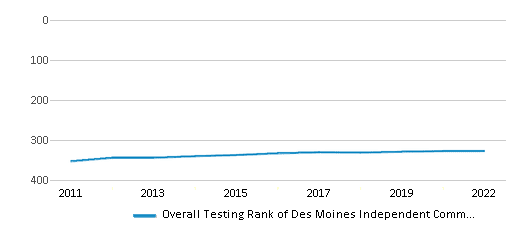
Math Test Scores (% Proficient)
40%
64%
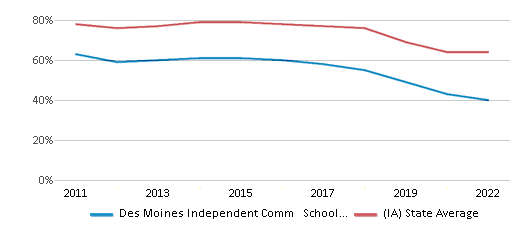
Reading/Language Arts Test Scores (% Proficient)
49%
70%
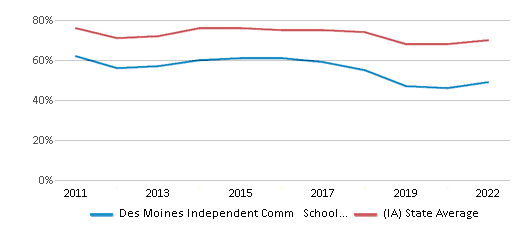
Science Test Scores (% Proficient)
41%
63%
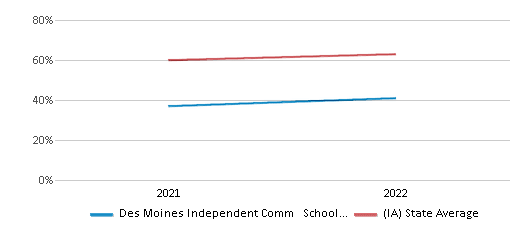
Graduation Rate
76%
90%
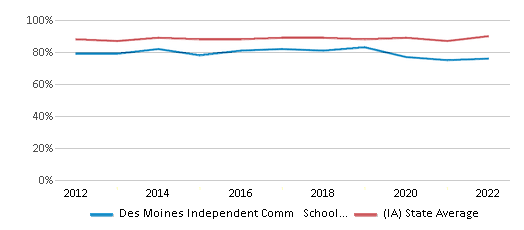
Students by Ethnicity:
Diversity Score
0.75
0.45
# American Indian Students
132 Students
532 Students
% American Indian Students
n/a
n/a
# Asian Students
2,333 Students
2,925 Students
% Asian Students
8%
2%
# Hispanic Students
9,313 Students
18,818 Students
% Hispanic Students
31%
13%
# Black Students
6,410 Students
9,688 Students
% Black Students
22%
6%
# White Students
9,505 Students
111,231 Students
% White Students
32%
73%
# Hawaiian Students
68 Students
1,189 Students
% Hawaiian Students
n/a
1%
# Two or more races Students
2,075 Students
7,501 Students
% of Two or more races Students
7%
5%
Students by Grade:
# Students in PK Grade:
1,358
23,036
# Students in K Grade:
2,136
25,738
# Students in 1st Grade:
2,303
22,613
# Students in 2nd Grade:
2,265
21,812
# Students in 3rd Grade:
2,087
20,001
# Students in 4th Grade:
2,226
18,600
# Students in 5th Grade:
2,152
14,277
# Students in 6th Grade:
1,963
5,389
# Students in 7th Grade:
2,033
67
# Students in 8th Grade:
1,957
108
# Students in 9th Grade:
2,185
31
# Students in 10th Grade:
2,330
54
# Students in 11th Grade:
2,339
71
# Students in 12th Grade:
2,537
97
# Ungraded Students:
-
-
District Revenue and Spending
The revenue/student of $19,764 is higher than the state median of $16,468. The school district revenue/student has stayed relatively flat over four school years.
The school district's spending/student of $17,189 is higher than the state median of $16,042. The school district spending/student has stayed relatively flat over four school years.
Total Revenue
$590 MM
$8,262 MM
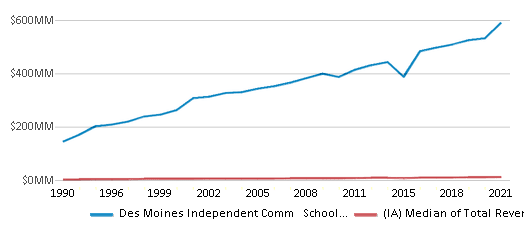
Spending
$513 MM
$8,048 MM
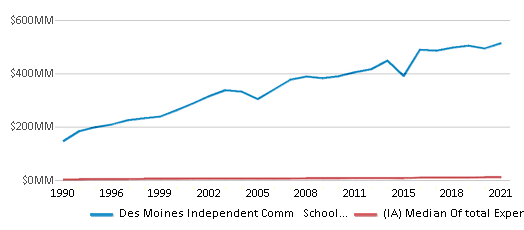
Revenue / Student
$19,764
$16,468
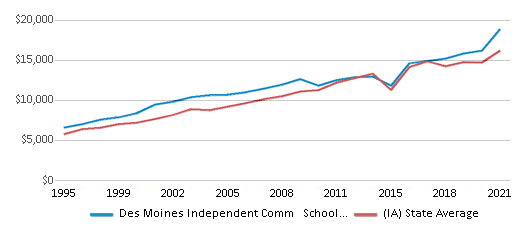
Spending / Student
$17,189
$16,042
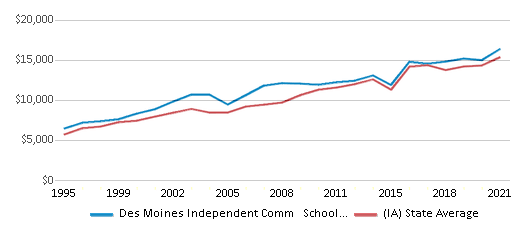
Best Des Moines Independent Comm School District Public Preschools (2025)
School
(Math and Reading Proficiency)
(Math and Reading Proficiency)
Location
Grades
Students
Rank: #11.
Cowles Elementary School
(Math: 75-79% | Reading: 85-89%)
Rank:
Rank:
9/
Top 20%10
6401 College Ave
Windsor Heights, IA 50324
(515) 242-7818
Windsor Heights, IA 50324
(515) 242-7818
Grades: PK-8
| 403 students
Rank: #22.
Greenwood Elementary School
(Math: 60-64% | Reading: 65-69%)
Rank:
Rank:
4/
Bottom 50%10
316 37th Street
Des Moines, IA 50312
(515) 242-8410
Des Moines, IA 50312
(515) 242-8410
Grades: PK-5
| 307 students
Rank: #33.
Walnut Street School
(Math: 40-44% | Reading: 55-59%)
Rank:
Rank:
2/
Bottom 50%10
901 Walnut St
Des Moines, IA 50309
(515) 242-8438
Des Moines, IA 50309
(515) 242-8438
Grades: PK-5
| 244 students
Rank: #44.
Jackson Elementary School
(Math: 40-44% | Reading: 45-49%)
Rank:
Rank:
1/
Bottom 50%10
3825 Indianola Ave
Des Moines, IA 50315
(515) 242-8415
Des Moines, IA 50315
(515) 242-8415
Grades: PK-5
| 495 students
Rank: #55.
Moulton Elementary School
(Math: 40-44% | Reading: 30-34%)
Rank:
Rank:
1/
Bottom 50%10
1541 8th Street
Des Moines, IA 50314
(515) 242-8427
Des Moines, IA 50314
(515) 242-8427
Grades: PK-5
| 450 students
Rank: #66.
Mckinley Elementary School
(Math: 35-39% | Reading: 40-44%)
Rank:
Rank:
1/
Bottom 50%10
1610 Se 6th Street
Des Moines, IA 50315
(515) 242-8423
Des Moines, IA 50315
(515) 242-8423
Grades: PK-5
| 269 students
Rank: #77.
Capitol View Elementary School
(Math: 30% | Reading: 41%)
Rank:
Rank:
1/
Bottom 50%10
320 E. 16th
Des Moines, IA 50316
(515) 242-8402
Des Moines, IA 50316
(515) 242-8402
Grades: PK-5
| 545 students
Rank: #88.
Carver Elementary School
(Math: 29% | Reading: 29%)
Rank:
Rank:
1/
Bottom 50%10
705 E University Ave
Des Moines, IA 50316
(515) 242-8418
Des Moines, IA 50316
(515) 242-8418
Grades: PK-5
| 419 students
Rank: n/an/a
1801 16th Street
Des Moines, IA 50314
(515) 242-8424
Des Moines, IA 50314
(515) 242-8424
Grades: PK
| 194 students
Rank: n/an/a
2115 E 39th St
Des Moines, IA 50317
(515) 323-8628
Des Moines, IA 50317
(515) 323-8628
Grades: PK
| 263 students
Rank: n/an/a
111 Porter
Des Moines, IA 50310
(515) 242-8424
Des Moines, IA 50310
(515) 242-8424
Grades: PK
| 340 students
Rank: n/an/a
4000 Lower Beaver Rd
Des Moines, IA 50310
(515) 242-8213
Des Moines, IA 50310
(515) 242-8213
Grades: PK
| 215 students
Recent Articles

Year-Round Or Traditional Schedule?
Which is more appropriate for your child? A year-round attendance schedule or traditional schedule? We look at the pros and cons.

Why You Should Encourage Your Child to Join a Sports Team
Participating in team sports has a great many benefits for children, there is no doubt. In this article you will learn what those benefits are.

White Students are Now the Minority in U.S. Public Schools
Increasing birth rates among immigrant families from Asia and Central and South America, combined with lower birth rates among white families, means that for the first time in history, public school students in the United States are majority-minority. This shift in demographics poses difficulties for schools as they work to accommodate children of varying language abilities and socio-economic backgrounds.





